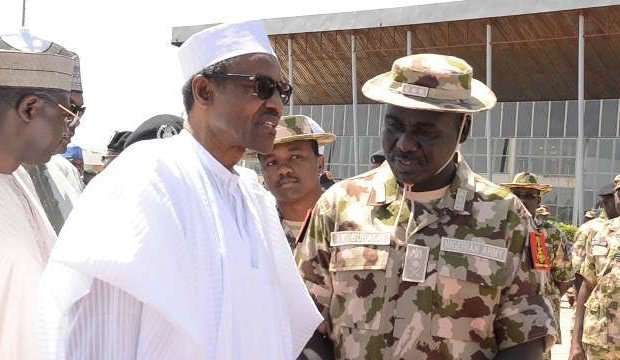PREMIUM TIMES observes with increasing alarm the bullish behaviour and lack of restraint of the Nigerian state, as well as the blatant disregard for the requisite separation between the state and the ruling All Progressives Congress (APC). The recent dastardly action of the State Security Service (SSS), summoning senior officials of the Independent National Electoral Commission (INEC), is a culmination of a series of actions taken by the executive arm of government, with alarming erosive consequences on Nigeria’s democratic institutions.
Nigerians woke up yesterday morning to the alarming news that the SSS had summoned Okechukwu Ibeanu, INEC’s head of Operations and Logistics, and other top officials of the electoral commission, under strange allegations that the logistical blunder that led to the postponement of the presidential and national assembly elections may have been deliberately facilitated to undermine the electoral process. These purported summonses were subsequently withdrawn. However, PREMIUM TIMES notes that this action came within a few days of the persistent demonisation of INEC and its key officials by both the APC and the main opposition party, the People’s Democratic Party (PDP). Accusations and counter-accusations from both parties and their agents have sought to ascribe plans to rig the electoral system on INEC in favour of one party or the other, with no tangible supporting evidence.
Whilst PREMIUM TIMES acknowledges the profound failure of the electoral body and makes no excuses for INEC, we recognise the logistical failures in the organisation as a long-existent problem, which both the ruling and opposition party governments must also share the blame for. Delayed voting has dogged the electoral system as far back as the 2007 general elections. Subsequent logistical failures led to delays in the voting process in 2011, when the National Assembly elections were cancelled and postponed, even as the electorate stood in queues to cast their ballots. In 2015, the then ruling party PDP postponed the general elections two weeks before the set date, citing security concerns. It is, therefore, hypocritical of both parties, whose governments, having failed to address the multiple administrative and structural problems of the Nigerian civil service, to blow hot and cold, threatening the very democratic structure of the state in their bid to secure votes in the 2019 elections.
In particular, PREMIUM TIMES notes that President Buhari’s utterances, as those of key members of his political party, have merged his capacity as the commander-in-chief of the Nigerian armed forces with his capacity as a candidate of the APC standing for elections. For example, by promising to find out ‘who is responsible’ for INEC’s incompetence after the elections, the president presumes that he will win the 2019 elections, and thereby, will be in a position to punish those responsible for the logistical failure in INEC. Yet this decision, whether or not to retain the incumbent president, must be taken by the Nigerian electorate, who continue to bear the brunt of government inefficiencies, whether in the form of the failure of the existing administration to provide the so-called dividends of democracy or the failure in service delivery by government ministries and departments.
These inefficiencies are highlighted by the very blunder of the late-night SSS summons. The summons, which PREMIUM TIMES reports were confirmed by individuals within the state institution, appear ill-advised and targeted at the wrong officials in INEC. As the country’s major intelligence organisation, the SSS ought to be well aware that electoral logistics for the 2019 general elections have been ceded to the INEC special ad hoc committee, of which the military institutions are members. In January 2019, INEC chairman Professor Mahmood Yakubu set up the special committee to coordinate logistics during the elections, headed by Retired AVM Ahmed Mu’azu. The electoral logistics committee was charged with ensuring the timely delivery of all materials to more than 180,000 locations covering the country’s 1,558 constituencies. A similar committee was set up for collation. Mr Ibeano could, therefore, not have been directly responsible for the logistical failures and national embarrassment of February 15.
What then was the purpose of the summons? PREMIUM TIMES surmises that the summons were nothing more than grandstanding on the part of the intelligence organisation, perhaps to satisfy the rage of the Buhari administration, even as his party seeks a scapegoat for last week’s disaster. The SSS is, therefore, serving as a tool in the hands of the executive government as it perpetuates its disregard for the rule of law and the separation of offices, especially in the lead-up to the elections.
PREMIUM TIMES calls for sobriety and self-reflection on the part of all relevant parties, including the Buhari administration, the ruling APC, and its main opposition, the PDP. We advise that rather than use the resources of the state to shore up support for candidate Buhari, all relevant actors should consider avenues through which the massive inefficiencies in state institutions, especially the electoral commission, can be unbundled and resolved. We argue that long-standing recommendations for reform should be brought back to the table and reconsidered for possible adoption. For example, perhaps it is time to dust up the 2008 Report of the Electoral Reform Committee, as led by Justice Muhammadu Uwais. We contend that Nigerians collectively share the disgrace that such inefficiencies have caused. More substantively, we contend that Nigerians share in the humongous economic burden that these failures have caused, with the 2019 losses currently estimated at $2.3 million, including forgone GDP and cost to INEC.
PREMIUM TIMES calls for support for INEC, to help the body conduct credible elections beginning from Saturday. We remind President Buhari that he must take responsibility for the failures of organs of government under his watch. We argue that rather than demonise INEC or encourage retributive actions on its key officials, the administration should support INEC to uncover and resolve the sources of inefficiencies, thereby building a stronger electoral system in West Africa’s hegemon. We thank President Buhari for his service and remind him that in the spirit of the democratic system within which he now operates, his actions must align with the tenets of this system.



![#SilencedVoices: ‘Magnetic Mom’ Brittany Galvin Gives Horrific Account of Her Paralyzing Journey Since Receiving Jabs [VIDEO]](https://newsrescue.one/wp-content/uploads/2021/08/brittany-218x150.png)
![Yoruba Man Burns Nigerian Passport, Dares SSS; Will Only Return To Odudua Republic [VIDEO]](https://newsrescue.one/wp-content/uploads/2019/10/burns-passport-218x150.jpg)




![How Gbajabiamila ‘Stole $25,000 From a US Lady Who Lost Her Eye and 7 Teeth, Fled US… Was Charged To Repay 3 Years Later’ [DOCUMENTS & PETITION]](https://newsrescue.one/wp-content/uploads/2019/06/gbajan.png)
